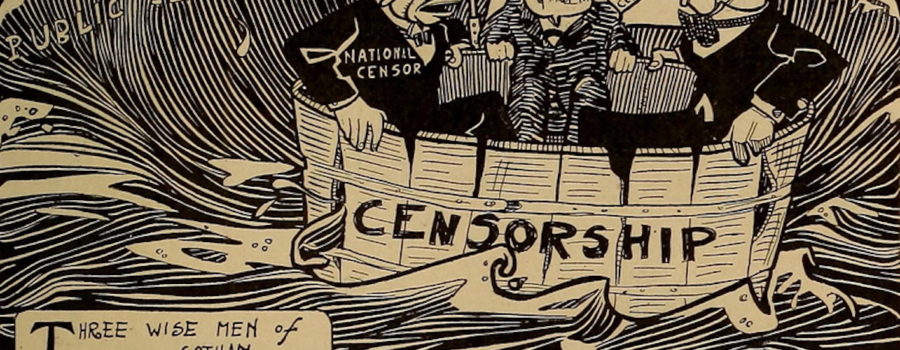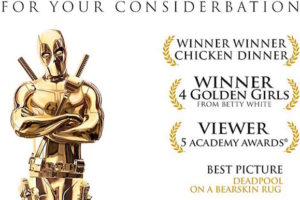[Published at Living Life Fearless] Government censorship in film is inherently a bipartisan issue. The antiquated “both sides” argument does not apply to this alarming issue. It is nonsensical; it would be an exhaustive, self-confuting thesis to attempt to argue that censorship is the fault of certain corrupt, partisan leaders or administrations throughout U.S. history. Government censorship and involvement in film to sway public opinion has been happening under every administration, left or right leaning, for over a century. Both Democrats and Republicans have censored films to protect the government and its institutions due to long-established, deep-rooted traditions, always with the same goal of molding a specific geopolitical worldview of the U.S., regardless of party affiliation.
This series of three articles will cover censorship under liberal and conservative administrations fighting to preserve the diminishing, collective public perception of supposed “universal truths” in the postmodern world. The vast majority of censorship happens when films tell stories that depict government institutions, especially the military, C.I.A., FBI, and Homeland Security, whose images – which are representative of the U.S. as a whole (regardless of who occupies the oval office) – they have an obligation to protect. This perception that the government so desperately wants the public to hold onto is the idea that the U.S. is an entirely selfless, philanthropic, and magnanimous country.

SHOWTIME
The sum total effect of this long-term project on behalf of the national security state is to render the American public incapable of making any fundamental, systematic critique of our military, intelligence agencies, or foreign policy. Any destruction caused by them is either an unintended consequence of well-intentioned patriotic public servants or else the result of a few bad apples operating within an otherwise benign or often benevolent organization.
This issue isn’t about individuals, it is about structures of power. It always has been.
A more apprised understanding of geopolitics, one in which global conflicts are the result of various groups vying for political power, and the U.S. is the imperial hegemon, using war and covert operations not to keep Americans safe or spread democracy, but to maintain its domination by not only feeding its economic power through the extraction of valuable raw materials, but suppressing any movement that would challenge the post-Cold War order (unipolarity), is never considered. And it takes very little effort on the part of the Pentagon’s (the headquarters and metonym of the United States Department of Defense and its leadership and symbol of the U.S. military) various public relations arms to maintain this paradigm.
That isn’t to say that all enemies Americans engage in war with are “good,” or that every American within the military industrial complex is “bad” (good and bad are relative terms, and there are moral grey areas that transcend the U.S.’s self-righteous, defend-our-freedom-from-evil propaganda). In fact, therein lies the exact point. This issue isn’t about individuals, it is about structures of power. It always has been.
This series, if you will, will also explore the roots of this deep state obsession with and infiltration of the entertainment industry. United States censorship in film began domestically, as waves of conservatism attempted to put out the bold fires of of the budding film industry in the early 1900s, and slowly evolved into a systematic domestic and international operation to preserve an ideal of a nation that never quite was: “The land of the free…”
The Marriage of Evangelism & Censorship
Before the federal government was involved in censorship in film, there were city and state laws and coalitions, fueled by the same extreme, conservative evangelist values that are flooding our country today, from the Oval Office to the cesspool of evangelism in middle America and the south. Chicago was the first city to pass a censorship law in America in 1907. Other cities, and even states, quickly followed suit in the coming years. In 1909, the National Board of Motion Picture Censorship, now called the National Board of Review of Motion Pictures, was established in New York. Predominantly representing evangelistic ideologies, the National Board was formed in an attempt to preserve Christian values, which films supposedly directly threatened. To evangelists, it was their god-given duty to preserve these conservative ideals, which they conflated with those of democracy, and fought to spread them in film in an age where a new form of high art became the ultimate form of expression and mass communication. It was, in a sense, a further extension of Manifest Destiny.
To evangelists, it was their god-given duty to preserve these conservative ideals, which they conflated with those of democracy
Naturally, it wasn’t only about preserving traditional values, it was also about ensuring that Christian supremacy remains intact against “threats” such as the Roman Catholics and Jews. Again, like today, the early 20th century was rife with anti-semitism, and the Jews had an unprecedented dexterity in film aesthetic, coupled with a superior motion picture business acumen. By the 1920s, the Jews had formed as close to a monopoly in motion picture production and distribution as possible; an ironic backfire of early evangelistic efforts to thwart Jewish power in film and create a protestant monopoly. In the midst of the Second Industrial Revolution – during which urbanization, mass immigration, and exponential economic growth characterized America – a diverse population engaged in mass consumerism, including the consumption of film.
As the National Board perceived the cinema-economic climate, producers, largely consisting of Jewish immigrants, were profiting off of immoral movies, and profiting off of something that was supposedly detrimental to Christian values was “commercialized iniquity,” a term coined by Charles S. Macfarland in his book The Progress of Church Federation. Although they attempted to censor films until the 1950s, their backwards, anti-semitic ideologies eventually stripped them of their credibility within the film industry.
Questionable Moral Standards
Ironically, the only film that should’ve been censored during that time period was D.W. Griffith’s The Birth of a Nation, which portrayed the Ku Klux Klan as righteous heroes in the post-reconstruction Civil War period, saving America from the integration of white and black people (black males were portrayed as an inferior race who preyed on white women). This damaging depiction was widely regarded as historically accurate at the time, and its influence, which redistributed power to the KKK after they had been dismantled post-Civil War, still poison’s America’s moral compass today. During a screening at the White House, President Woodrow Wilson even praised the film as historical canon, saying, “It is like writing history with lightning. And my only regret is that it is all so terribly true.”

EPOCH PRODUCING CORPORATION
The city and state laws would naturally progress into something greater. Bleed en masse into one entity in order to form an uniform set of viewing rules and regulations for all films distributed in the U.S. That entity would morph into the Motion Picture Association of America (MPAA), consistently run by former government affiliated and increasingly high ranked officials, an organization that would set forth a heap of hurdles for filmmakers across the world attempting to make art that conflicted with their conservative ideals through the Hays Code. As with any organization with an ulterior agenda, their oftentimes contradicting ratings can give viewers a peek at their true colors. For example, The Birth of a Nation is rated TV-PG, a rating given by the MPAA and modeled after its feature film rating system. The MPAA has the power to demand which content filmmakers should censor in order to obtain the rating they desire for their target market and budgeted ROI. Oftentimes, depending on genre, an R rating for a film can mean a lower box office life for it than a PG-13 would. And an NC-17, in almost all cases, essentially eliminates a film’s potential for any box office return.
The subsequent article in this series will revisit the rise of the MPAA and the beginning of federal government monopolization of U.S. political depiction in film. Stay tuned.
REFERENCES:
https://ncac.org/resource/a-brief-history-of-film-censorship
https://www.businessinsider.com/cia-helped-produce-zero-dark-thirty
https://gawker.com/declassified-memo-shows-how-cia-shaped-zero-dark-thirty-493174407
https://theoutline.com/post/3794/hollywood-propaganda-12-strong-phil-strub?zd=1&zi=wymanfdl
https://newspunch.com/lawsuit-cia-hollywood/








Leave a Reply
Your email is safe with us.